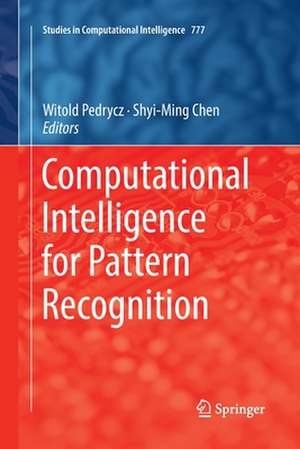Computational Intelligence for Pattern Recognition: Studies in Computational Intelligence, cartea 777
Editat de Witold Pedrycz, Shyi-Ming Chenen Limba Engleză Paperback – 30 ian 2019
| Toate formatele și edițiile | Preț | Express |
|---|---|---|
| Paperback (1) | 993.93 lei 6-8 săpt. | |
| Springer International Publishing – 30 ian 2019 | 993.93 lei 6-8 săpt. | |
| Hardback (1) | 1000.38 lei 6-8 săpt. | |
| Springer International Publishing – 15 mai 2018 | 1000.38 lei 6-8 săpt. |
Din seria Studies in Computational Intelligence
- 20%
 Preț: 449.37 lei
Preț: 449.37 lei - 20%
 Preț: 1158.26 lei
Preț: 1158.26 lei - 20%
 Preț: 986.66 lei
Preț: 986.66 lei - 20%
 Preț: 1452.76 lei
Preț: 1452.76 lei - 20%
 Preț: 168.78 lei
Preț: 168.78 lei - 20%
 Preț: 1291.10 lei
Preț: 1291.10 lei - 18%
 Preț: 1112.30 lei
Preț: 1112.30 lei - 20%
 Preț: 565.39 lei
Preț: 565.39 lei - 20%
 Preț: 649.28 lei
Preț: 649.28 lei - 20%
 Preț: 1047.73 lei
Preț: 1047.73 lei - 20%
 Preț: 1578.96 lei
Preț: 1578.96 lei - 20%
 Preț: 643.50 lei
Preț: 643.50 lei - 20%
 Preț: 657.49 lei
Preț: 657.49 lei - 20%
 Preț: 993.28 lei
Preț: 993.28 lei - 20%
 Preț: 990.80 lei
Preț: 990.80 lei - 20%
 Preț: 989.96 lei
Preț: 989.96 lei - 20%
 Preț: 1165.69 lei
Preț: 1165.69 lei - 20%
 Preț: 1444.52 lei
Preț: 1444.52 lei - 20%
 Preț: 1041.96 lei
Preț: 1041.96 lei - 20%
 Preț: 1047.73 lei
Preț: 1047.73 lei - 20%
 Preț: 1046.06 lei
Preț: 1046.06 lei - 18%
 Preț: 2500.50 lei
Preț: 2500.50 lei - 20%
 Preț: 989.13 lei
Preț: 989.13 lei - 20%
 Preț: 1165.69 lei
Preț: 1165.69 lei - 20%
 Preț: 1164.05 lei
Preț: 1164.05 lei - 20%
 Preț: 1042.79 lei
Preț: 1042.79 lei - 20%
 Preț: 1460.19 lei
Preț: 1460.19 lei - 18%
 Preț: 1403.52 lei
Preț: 1403.52 lei - 18%
 Preț: 1124.92 lei
Preț: 1124.92 lei - 20%
 Preț: 1039.47 lei
Preț: 1039.47 lei - 20%
 Preț: 1008.11 lei
Preț: 1008.11 lei - 20%
 Preț: 1045.25 lei
Preț: 1045.25 lei - 20%
 Preț: 1275.42 lei
Preț: 1275.42 lei - 20%
 Preț: 1040.32 lei
Preț: 1040.32 lei - 20%
 Preț: 988.32 lei
Preț: 988.32 lei - 20%
 Preț: 1169.79 lei
Preț: 1169.79 lei - 20%
 Preț: 1162.37 lei
Preț: 1162.37 lei - 20%
 Preț: 1059.26 lei
Preț: 1059.26 lei - 20%
 Preț: 1164.05 lei
Preț: 1164.05 lei - 20%
 Preț: 1166.52 lei
Preț: 1166.52 lei - 20%
 Preț: 1459.38 lei
Preț: 1459.38 lei - 18%
 Preț: 1005.74 lei
Preț: 1005.74 lei - 20%
 Preț: 997.38 lei
Preț: 997.38 lei - 20%
 Preț: 1055.94 lei
Preț: 1055.94 lei - 20%
 Preț: 1284.47 lei
Preț: 1284.47 lei - 20%
 Preț: 994.08 lei
Preț: 994.08 lei - 20%
 Preț: 1048.72 lei
Preț: 1048.72 lei - 20%
 Preț: 1066.02 lei
Preț: 1066.02 lei - 20%
 Preț: 943.78 lei
Preț: 943.78 lei - 20%
 Preț: 1173.10 lei
Preț: 1173.10 lei
Preț: 993.93 lei
Preț vechi: 1242.41 lei
-20% Nou
Puncte Express: 1491
Preț estimativ în valută:
190.21€ • 197.85$ • 157.03£
190.21€ • 197.85$ • 157.03£
Carte tipărită la comandă
Livrare economică 14-28 aprilie
Preluare comenzi: 021 569.72.76
Specificații
ISBN-13: 9783030078195
ISBN-10: 3030078191
Ilustrații: VIII, 428 p. 151 illus., 118 illus. in color.
Dimensiuni: 155 x 235 mm
Greutate: 0.61 kg
Ediția:Softcover reprint of the original 1st ed. 2018
Editura: Springer International Publishing
Colecția Springer
Seria Studies in Computational Intelligence
Locul publicării:Cham, Switzerland
ISBN-10: 3030078191
Ilustrații: VIII, 428 p. 151 illus., 118 illus. in color.
Dimensiuni: 155 x 235 mm
Greutate: 0.61 kg
Ediția:Softcover reprint of the original 1st ed. 2018
Editura: Springer International Publishing
Colecția Springer
Seria Studies in Computational Intelligence
Locul publicării:Cham, Switzerland
Cuprins
Robust Constrained Concept Factorization.- An Automatic Cycling Performance Measurement System Based on ANFIS.- Fuzzy Classifiers Learned Through SVMs With Application to Specific Object Detection and Shape Extraction Using an RGB-D Camera.- Low Cost Parkinson’s Disease Early Detection and Classification Based on Voice and Electromyography Signal.- Particle Swarm Optimization Based HMM Parameter Estimation for Spectrum Sensing in Cognitive Radio System.- Improving Sparse Representation-Based Classification Using Local Principal Component Analysis.- Fuzzy Choquet Integration of Deep Convolutional Neural Networks for Remote Sensing.- Computational Intelligence for Pattern Recognition in EEG Signals.- Neural Network Based Physical Disorder Recognition for Elderly Health Care.- Deep Neural Networks for Structured Data.- Recognizing Subtle Micro-Facial Expressions Using Fuzzy Histogram of Optical Flow Orientations and Feature Selection Methods.- Granular Computing Techniques for Bioinformatics Pattern Recognition Problems in Non-Metric Spaces.- Multi-Classifier-Systems: Architectures, Algorithms and Applications.- Learning Label Dependency and Label Preference Relations in Graded Multi-Label Classification.- Improved Deep Neural Network Object Tracking System for Applications in Home Robotics.
Textul de pe ultima copertă
The book presents a comprehensive and up-to-date review of fuzzy pattern recognition. It carefully discusses a range of methodological and algorithmic issues, as well as implementations and case studies, and identifies the best design practices, assesses business models and practices of pattern recognition in real-world applications in industry, health care, administration, and business. Since the inception of fuzzy sets, fuzzy pattern recognition with its methodology, algorithms, and applications, has offered new insights into the principles and practice of pattern classification. Computational intelligence (CI) establishes a comprehensive framework aimed at fostering the paradigm of pattern recognition. The collection of contributions included in this book offers a representative overview of the advances in the area, with timely, in-depth and comprehensive material on the conceptually appealing and practically sound methodology and practices of CI-based pattern recognition.
Caracteristici
Provides a comprehensive and up-to-date overview, covering a spectrum of methodological and algorithmic issues, and discussing implementations and case studies Identifies best design practices, assessing business models and pattern recognition in industry, health care, administration, and business Offers a systematic introduction to the concepts, design methodology, and detailed algorithms Includes individual chapters with clearly defined structures and well-defined focuses and additional reading material available via carefully selected references
